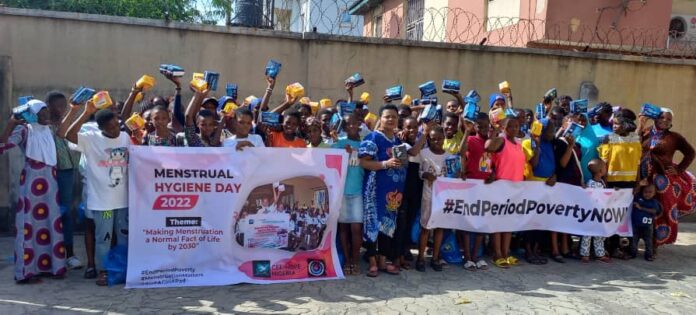Menstrual flow is a normal fact of life and it is not a taboo or a dirty act that women of reproductive age should be ashamed of.
By Ishaya Ibrahim, News Editor
A non-governmental organisation, the Centre for Children’s Health Education, Orientation and Protection (CEE-HOPE), has marked this year’s World Menstrual Hygiene Day with a sensitization workshop for girls on hygiene and sexual violence.
The event, attended by hundreds of girls and invited guests at CEE-HOPE’s head office in Lagos, also featured free distribution of sanitary pads.

CEE-HOPE’s executive director, Betty Abah, decried the lack of free pads for girls and women of reproductive age in Nigeria, saying it has compounded their economic woes.
According to her, menses affects the education of girls who lack the money to buy pads. She said they simply miss school in the four to five days of their flow.
She said the pressure could be avoided if the Nigerian government tow the path of fellow African countries like Kenya and Uganda where it is provided free to women of reproductive age.

READ ALSO
BBNaija Pere refutes dating Kogi gov’s wife, threatens legal action
She told the girls during her talk: “It has been discovered that women are finding it difficult to buy pads. When you reach puberty, every month you have to buy pads because you cannot tell your period to take a break because you don’t have money or because it’s Buhari’s tenure. Some girls cut their mattresses to use as pads. That is unhealthy,” she said.
She asked the girls if they would want the government to make free pads available to them which they all chorused ‘yes.’
A guest speaker, Anker Amurawaiye, gave the girls some hygiene tips during their period.

She said when they are on their menstrual period, they should raise their level of hygiene three times more.
She said pads should be changed every time they use the toilet by washing their hands before and after the change.
She also urged the girls to ensure that they dry their pants where sunlight can reach them because sunlight is a natural disinfectant.
She also taught them how to properly dispose of used pads.
An activist, Anthonia Ojenagbon, educated the girls on sexual violence and what it meant.
She said sexual violence is any form of sexual activity with anyone below the age of 18-years. She drew examples from her experience of being defiled at age 14 and how it affected her mental health.

She urged the girls not to allow anyone to touch them inappropriately as most sexual violence begins from there.
Another activist, Yinka Kenny, said menstruation is a normal fact of life and that it is not a taboo or a dirty act that they should be ashamed of.
Other speakers who addressed the girls virtually (via video) on period poverty and menstrual hygiene management were Sanaa Mehajer of Girls on A Mission (GOAM), Australia and Andrea Guadalupe Rodriguez of OPC NGO, Mexico.
The event also witnessed the launch of CEE-HOPE’s latest advocacy movie, “Leave to Live,” which focuses on domestic violence. It featured eminent Nollywood actors such as Segun Arinze, Ngozi Nwosu Papa Ajasco amongst others.
Participants at the event were girls from Makoko, Ori-Oke, Monkey Village, Ifelodun communities in Lagos and Matogun in Ogun States.












